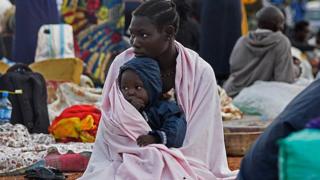sudan
Senior Member
- Oct 17, 2012
- 266
- 11
- 51
Kakuma camp in northern Kenya is expanding by nearly a half, the U.N. refugee agency said on Saturday, to house refugees fleeing nearby South Sudan as hopes fade for peace in the world's newest nation.
The arrival of some 44,000 South Sudanese refugees since late 2013, when fighting broke out between forces loyal to President Salva Kiir and rebels allied with former Vice President Riek Machar, has stretched the camp to its limits.
"Before the resumption of the current crisis, what we hoped was that the camp would shut. But what we've seen, since December 2013, is actually the contrary," said Raouf Mazou, the U.N. refugee agency's Kenya representative.
Kakuma is home to some 185,000 people, mostly from South Sudan, and with the planned expansion it will soon accommodate up to 80,000 more. The extra space will help ease congestion as well as make room for new arrivals.
The sprawling Kakuma camp was set up in Kenya's arid Turkana County in 1992 to accommodate thousands of "Lost Boys" who fled the southern part of what was then Sudan and walked hundreds of miles to Kenya.
A 2005 peace deal paved the way for South Sudan's 2011 independence and the United Nations launched a repatriation programme. By 2008, officials contemplated the camp's closure.
But the crisis involving long-time rivals Kiir and Machar has led to fierce fighting along ethnic lines: Kiir is an ethnic Dinka and Machar is Nuer.
Thousands have been killed and more than 1.5 million people have been displaced, while another 500,000 have fled to neighbouring countries, especially Ethiopia and Uganda, the United Nations has said.
"Nobody thinks that they can go back," said Andrew Riek Wal, 24, who lived in Kakuma for a decade before returning home in 2011, only to come back to the camp in 2013. "I am very worried about going back because I may be killed."
During his brief return, Wal got a job teaching English in the capital Juba and began searching for family members. But when fighting resumed, he feared he was especially vulnerable.
Because he had spent his adolescence in Kakuma, he was never given the distinctive horizontal forehead marks that distinguish Nuer men, and he feared he would be mistaken for a Dinka.
"Living this life of a refugee, it seems like I am in prison," he said.
The arrival of some 44,000 South Sudanese refugees since late 2013, when fighting broke out between forces loyal to President Salva Kiir and rebels allied with former Vice President Riek Machar, has stretched the camp to its limits.
"Before the resumption of the current crisis, what we hoped was that the camp would shut. But what we've seen, since December 2013, is actually the contrary," said Raouf Mazou, the U.N. refugee agency's Kenya representative.
Kakuma is home to some 185,000 people, mostly from South Sudan, and with the planned expansion it will soon accommodate up to 80,000 more. The extra space will help ease congestion as well as make room for new arrivals.
The sprawling Kakuma camp was set up in Kenya's arid Turkana County in 1992 to accommodate thousands of "Lost Boys" who fled the southern part of what was then Sudan and walked hundreds of miles to Kenya.
A 2005 peace deal paved the way for South Sudan's 2011 independence and the United Nations launched a repatriation programme. By 2008, officials contemplated the camp's closure.
But the crisis involving long-time rivals Kiir and Machar has led to fierce fighting along ethnic lines: Kiir is an ethnic Dinka and Machar is Nuer.
Thousands have been killed and more than 1.5 million people have been displaced, while another 500,000 have fled to neighbouring countries, especially Ethiopia and Uganda, the United Nations has said.
"Nobody thinks that they can go back," said Andrew Riek Wal, 24, who lived in Kakuma for a decade before returning home in 2011, only to come back to the camp in 2013. "I am very worried about going back because I may be killed."
During his brief return, Wal got a job teaching English in the capital Juba and began searching for family members. But when fighting resumed, he feared he was especially vulnerable.
Because he had spent his adolescence in Kakuma, he was never given the distinctive horizontal forehead marks that distinguish Nuer men, and he feared he would be mistaken for a Dinka.
"Living this life of a refugee, it seems like I am in prison," he said.


